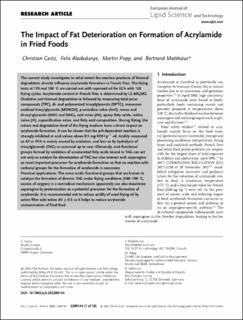Please use this identifier to cite or link to this item:
https://doi.org/10.21256/zhaw-27327Full metadata record
| DC Field | Value | Language |
|---|---|---|
| dc.contributor.author | Gertz, Christian | - |
| dc.contributor.author | Aladedunye, Felix | - |
| dc.contributor.author | Popp, Martin | - |
| dc.contributor.author | Matthäus, Bertrand | - |
| dc.date.accessioned | 2023-03-13T14:22:48Z | - |
| dc.date.available | 2023-03-13T14:22:48Z | - |
| dc.date.issued | 2023-02-20 | - |
| dc.identifier.issn | 1438-7697 | de_CH |
| dc.identifier.issn | 1438-9312 | de_CH |
| dc.identifier.uri | https://digitalcollection.zhaw.ch/handle/11475/27327 | - |
| dc.description.abstract | The current study investigates to what extent the reaction products of thermal degradation directly influence acrylamide formation in French fries. The frying tests at 170 and 180 °C are carried out with rapeseed oil for 32 h with 128 frying cycles. Acrylamide content in French fries is determined by LC-MS/MS. Oxidative and thermal degradation is followed by measuring total polar compounds (TPC), di- and polymerized triacylglycerols (DPTG), monomer oxidized triacylglycerols (MONOX), p-anisidine value (AnV), mono and di-acyl-glycerols (MAG and DAG), acid value (AV), epoxy fatty acids, iodine value (IV), saponification value, and fatty acid composition. During frying, the nature and degradation level of the frying medium have a direct impact on acrylamide formation. It can be shown that the pH-dependent reaction is strongly inhibited at acid values above 0.5 mg KOH g−1 oil. Acidity measured as AV or FFA is mainly caused by oxidation, and less so by hydrolysis of triacylglycerols (TAG) as assumed up to now. Obviously, acid functional groups formed by oxidation of unsaturated fatty acids bound in TAG can act not only as catalyst for dimerization of TAG but also interact with asparagine as most important precursor for acrylamide formation so that no reaction with carbonyl groups for the formation of acrylamide is necessary. Practical applications: The same acidic functional groups that are known to catalyze the formation of dimeric TAG under frying conditions (160–190 °C, access of oxygen) in a nonradical mechanism apparently can also deactivate asparagine by protonization as a potential precursor for the formation of acrylamide. It is recommended not to reduce acidity of used frying oil by active filter aids below AV ≥ 0.5 as it helps to reduce acrylamide contamination of fried food. | de_CH |
| dc.language.iso | en | de_CH |
| dc.publisher | Wiley | de_CH |
| dc.relation.ispartof | European Journal of Lipid Science and Technology | de_CH |
| dc.rights | http://creativecommons.org/licenses/by-nc-nd/4.0/ | de_CH |
| dc.subject | Acid value | de_CH |
| dc.subject | Acrylamide | de_CH |
| dc.subject | Frying | de_CH |
| dc.subject | Oxidation | de_CH |
| dc.subject.ddc | 664: Lebensmitteltechnologie | de_CH |
| dc.title | The impact of fat deterioration on formation of acrylamide in fried foods | de_CH |
| dc.type | Beitrag in wissenschaftlicher Zeitschrift | de_CH |
| dcterms.type | Text | de_CH |
| zhaw.departement | Life Sciences und Facility Management | de_CH |
| zhaw.organisationalunit | Institut für Lebensmittel- und Getränkeinnovation (ILGI) | de_CH |
| dc.identifier.doi | 10.1002/ejlt.202200144 | de_CH |
| dc.identifier.doi | 10.21256/zhaw-27327 | - |
| zhaw.funding.eu | No | de_CH |
| zhaw.issue | 4 | de_CH |
| zhaw.originated.zhaw | Yes | de_CH |
| zhaw.pages.start | 2200144 | de_CH |
| zhaw.publication.status | publishedVersion | de_CH |
| zhaw.volume | 125 | de_CH |
| zhaw.publication.review | Peer review (Publikation) | de_CH |
| zhaw.webfeed | Sensorik | de_CH |
| zhaw.author.additional | No | de_CH |
| zhaw.display.portrait | Yes | de_CH |
| Appears in collections: | Publikationen Life Sciences und Facility Management | |
Files in This Item:
| File | Description | Size | Format | |
|---|---|---|---|---|
| 2023_Gertz-etal_Impact-of-fat-deterioration-on-acrylamide-formation-in-fried-foods.pdf | 376.06 kB | Adobe PDF |  View/Open |
Show simple item record
Gertz, C., Aladedunye, F., Popp, M., & Matthäus, B. (2023). The impact of fat deterioration on formation of acrylamide in fried foods. European Journal of Lipid Science and Technology, 125(4), 2200144. https://doi.org/10.1002/ejlt.202200144
Gertz, C. et al. (2023) ‘The impact of fat deterioration on formation of acrylamide in fried foods’, European Journal of Lipid Science and Technology, 125(4), p. 2200144. Available at: https://doi.org/10.1002/ejlt.202200144.
C. Gertz, F. Aladedunye, M. Popp, and B. Matthäus, “The impact of fat deterioration on formation of acrylamide in fried foods,” European Journal of Lipid Science and Technology, vol. 125, no. 4, p. 2200144, Feb. 2023, doi: 10.1002/ejlt.202200144.
GERTZ, Christian, Felix ALADEDUNYE, Martin POPP und Bertrand MATTHÄUS, 2023. The impact of fat deterioration on formation of acrylamide in fried foods. European Journal of Lipid Science and Technology. 20 Februar 2023. Bd. 125, Nr. 4, S. 2200144. DOI 10.1002/ejlt.202200144
Gertz, Christian, Felix Aladedunye, Martin Popp, and Bertrand Matthäus. 2023. “The Impact of Fat Deterioration on Formation of Acrylamide in Fried Foods.” European Journal of Lipid Science and Technology 125 (4): 2200144. https://doi.org/10.1002/ejlt.202200144.
Gertz, Christian, et al. “The Impact of Fat Deterioration on Formation of Acrylamide in Fried Foods.” European Journal of Lipid Science and Technology, vol. 125, no. 4, Feb. 2023, p. 2200144, https://doi.org/10.1002/ejlt.202200144.
Items in DSpace are protected by copyright, with all rights reserved, unless otherwise indicated.